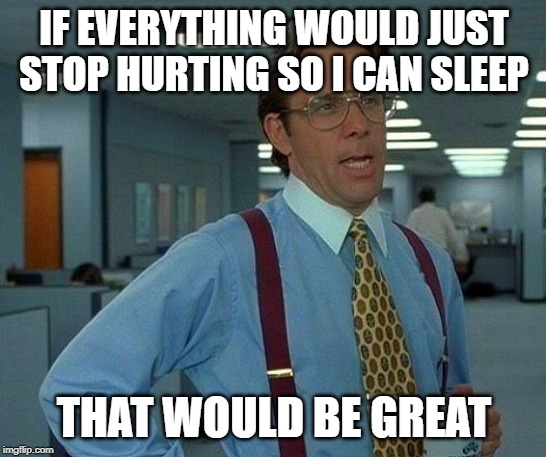Tenacious ME
Tackling disabling autoimmune disease with obstinance and humor.
Sleep- Why we need it and how to get some.

We all know that one of the keys to managing overall health is getting enough sleep. This becomes even more important when you have an autoimmune disease like RA. It is recommended that people suffering from autoimmune disease try for 9-14 hours of sleep a night. If you have an autoimmune disease you’re probably rolling your eyes right about now. I’m right there with you! As if that is even possible! Some nights I’m lucky to get 4 solid hours before the tossing and turning begins. Between the aches and pains, stress, and other lovely emotional junk autoimmune disease drags along with it, sleep can be hard to come by.

So why is sleep so important? It turns out there are several important processes that occur when we are at rest, processes that directly impact our ability to heal. While we sleep, cells regenerate, muscles repair, stress hormones shut off, and many regulatory hormones are replenished. Most of the processes involved in healing our bodies and regulating hormone function happen while we sleep. It is important to note that some of these processes only happen when we sleep. But why?

Think of your body like a shopping center. When it is open (awake) there is lots of activity going on, people come and go, removing things from the shelves, eating food from the shops, leaving trash behind. If not for the restocking of shelves, replenishing of ingredients, and cleanup that happens every night after closing, it’s pretty easy to see that shopping center would soon be empty and gross to boot.
The same is true for our bodies, without that nightly restocking and cleanup, we become drained of the resources to get through the day and bogged down by things we needed to shed.
Now that we know why we need sleep, it’s time to get to the how. How do you sleep with autoimmune disease? If your answer was poorly, take a look at these tips for getting a more restful sleep.
- Light Matters- In a modern world full of reasons to stay up and devices to light the dark, we tend to forget that we are light activated beings. The fact is, our bodies are happiest when they follow the natural rhythms created by light and dark cycles. Getting up early in the day and getting sun everyday is one of the ways this rhythm is set. This daily light trigger helps set our awake time. The other end of the day, winding down when it gets dark, is just as important. Taking time away from bright lights, especially computer screens and handheld devices, will signal your brain that night has come.
- Darkness my old friend- Knowing that dark is one of the things that triggers sleep, it makes sense that one of the big keys to falling asleep and staying asleep is not having a bunch of light in your bedroom. Shut off the tv, cover the alarm clock, invest in some blackout curtains, and consider using a sleep mask. The darker the room, the better you will rest.
- Distractions in action- A word about cellphones and sleep. Think of them like oil and water, they just don’t mix! Leave the cellphone in the living room. Between lights and sounds from alerts, these devices disrupt our sleep more than we realize! It took me months to realize that the tiny little indicator light on my cellphone reflected off the ceiling, often blinking for maximum visual disturbance. If you must bring them into your room, place phones screen side down and put them in do not disturb mode for the night to minimize interruptions.
- It’s a Matter of Comfort- One absolute necessity for restful sleep is comfort. Unfortunately for most autoimmune sufferers this is also the most challenging issue to conquer. Start by making your bed as comfortable as possible, with cozy bedding and a comfortable mattress. Add in several pillows for propping irritated body parts. You might also consider keeping a heated mattress pad or heated blanket on your bed to soothe aching muscles and joints and quiet their complaints. Finally, use your preferred pain management method before bed to ensure the best rest you can get.
- Calm Down- There is absolutely no doubt about it, stress destroys sleep. Whether we are actively thinking about the things we are stressed about or simply awash in the hormones stress causes our body to release, stress can make sleep really hard to come by. Practicing stress relief techniques throughout the day can help. It is especially helpful to do so just before sleep. Check here for some stress management strategies.
- The Power of Ritual- No, I’m not talking religious ritual here, though for many, prayer will certainly be part of the bedtime routine. Developing a sleep ritual helps cue your body that you are ready to rest. Taking an evening walk, reading, taking a bath, drinking a warm cup of tea, whatever you prefer to do to relax and unwind in the evening, try to make a habit of doing the same unwinding activities each night. Soon you will find that that cup of tea makes your eyes especially heavy as your body prepares to slumber.
- Cut the Caffeine- I know, I know, you’re exhausted all the time, how can you possibly consume less caffeine and get through the day? Believe it or not caffeine actually makes you more tired! When we consume caffeine it causes us to feel energized for awhile, burning up resources we’ve tricked our body into thinking we have. Once the caffeine high is gone, we are left even lower than before as we have burned energy we didn’t have in the first place. Add to that the way it also disrupts our sleep, and I am afraid my best advice is give it up!
- There’s an Herb for That- Once you have done all that you can to darken your sleeping space and lull your body to sleep, the next step is adding some sort of sleep aid. While there certainly are plenty of pharmaceutical options on the market, in this as in most things, I prefer to turn to herbs.
Do you struggle with sleep? Please share what helps you sleep better.
More on Sleep-
- The National Sleep Foundation- Healthy Sleep Tips
- Everyday Health- Autoimmune Disorders and Sleep Problems
- Autoimmune Wellness- Sleep why it’s so important to people with autoimmune disease



